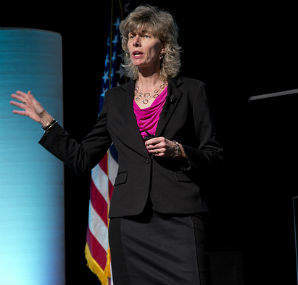In a speech at the annual Regulatory Information Conference, US Nuclear Regulatory Commissioner William Magwood stated that the NRC should evolve toward plant-specific regulation based on individual risk assessments.

In a speech at the annual Regulatory Information Conference, US Nuclear Regulatory Commissioner William Magwood stated that the NRC should evolve toward plant-specific regulation based on individual risk assessments.
"If we’ve learned nothing else over the years, it is that each nuclear power plant is a unique creature. In the United States, in particular, most plants are unique in design. They have wide variances in operating history and in the modifications incorporated over the years…Each site has unique characteristics and hazards that must be understood and addressed by plant design and operation."
He implied that for pragmatic reasons a plant- or site-specific approach had not been taken, so far at least. "The NRC staff does a good job of recognizing the different issues and features of each plant as it seeks to implement our regulations. But the fact exists that the agency issues and prioritizes regulatory actions on an industry-wide basis. It is not quite ‘one size fits all,’ but it is a close relative.
"We have taken diminutive steps toward site-specific prioritization, for example in implementing seismic and flooding reassessments. Staff has prioritized plants in groups to be reviewed over the coming months. This approach allows the NRC to prioritize the plants facing the most challenging seismic and flooding issues and enables us to apply our resources in a logical and effective fashion.
"But this barely scratches the surface of the benefits that can be obtained by designing the regulatory agenda on a plant-by-plant basis based, to the extent practical, upon a quantitative understanding of risk. Adopting such an approach would allow the resources at each plant to be focused on the safety issues of highest significance for that plant and get them done more quickly and more efficiently.
"Clearly, making this change will be difficult. It will require enhanced PRA tools and models and it will require research to develop the facts and data to support those models. It will require a shift in mindset in both the industry and NRC that embraces more fully probabilistic approaches. It will also require a willingness to make the up-front investments in order to realize long-term benefits."
These sentiments did not overlap with the prepared speeches of the two other commissioners publicly released by the morning of 13 March UK time (although all five spoke at the conference).
Chairman Allison MacFarlane discussed the NRC’s post-Fukushima response in her speech. She said that the continuous pursuit of knowledge was the best defence. "Fukushima forced us to challenge assumptions about accident severity and our approaches to maintaining defense-in-depth against the uncertainties that dynamic Earth systems pose."
MacFarlane, a geologist by training, raised evidence from the geological record. "One lesson in Earth science that has broad implications for all of our regulatory work is that we need to expect change. That means periodic fluctuations in the behavior of Earth systems and evolutionary change in our understanding of those systems. Our planet is constantly changing, and there’s no shortage of surprises, something regulators and operators generally aren’t fond of!
"For this important reason, I think we need to consider more carefully the vast geologic record in our decision-making. Events like the Great Tohoku earthquake have happened throughout the Earth’s history, and they’ll happen again. Sole dependence on historical data cannot accurately characterize the range of ‘normal’ in terms of how the Earth behaves."
Commissioner William Ostendorff went back to basics and considered whether the NRC was independent of outside influence, competent for its work, and transparent in its dealings (he concluded it is, in all three cases).
Photo: NRC Chairman Allison Macfarlane gives keynote address "Continued Learning: The Best Defense against an Uncertain Future" at the NRC’s 26th annual Regulatory Information Conference (Source: NRC)
Follow Will Dalrymple on Google+
